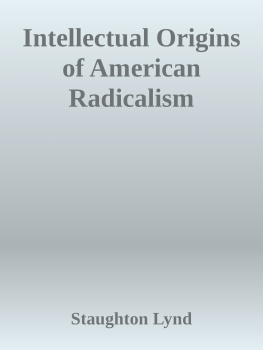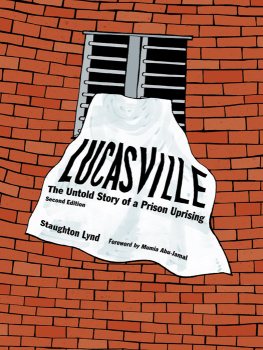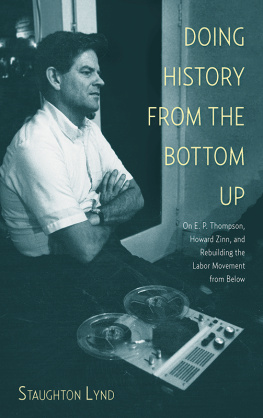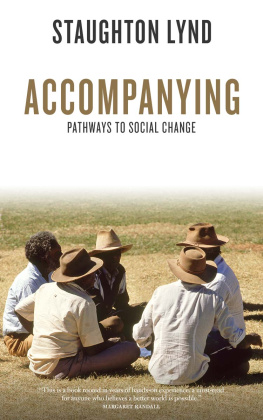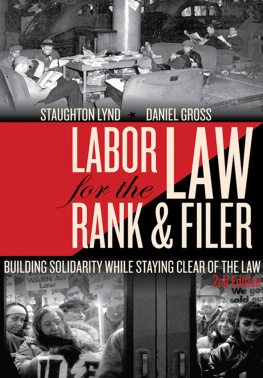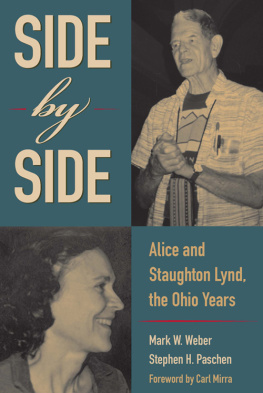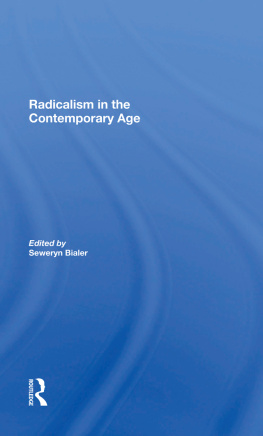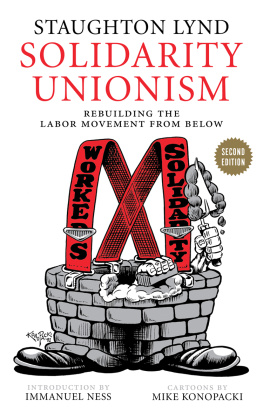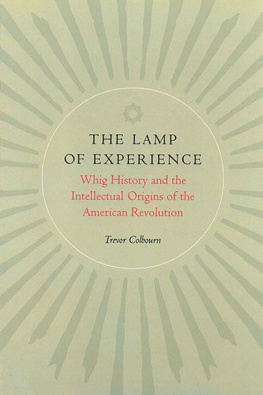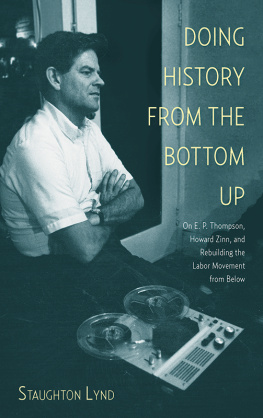Staughton Lynd - Intellectual Origins of American Radicalism
Here you can read online Staughton Lynd - Intellectual Origins of American Radicalism full text of the book (entire story) in english for free. Download pdf and epub, get meaning, cover and reviews about this ebook. year: 1973, genre: Politics. Description of the work, (preface) as well as reviews are available. Best literature library LitArk.com created for fans of good reading and offers a wide selection of genres:
Romance novel
Science fiction
Adventure
Detective
Science
History
Home and family
Prose
Art
Politics
Computer
Non-fiction
Religion
Business
Children
Humor
Choose a favorite category and find really read worthwhile books. Enjoy immersion in the world of imagination, feel the emotions of the characters or learn something new for yourself, make an fascinating discovery.
- Book:Intellectual Origins of American Radicalism
- Author:
- Genre:
- Year:1973
- Rating:3 / 5
- Favourites:Add to favourites
- Your mark:
- 60
- 1
- 2
- 3
- 4
- 5
Intellectual Origins of American Radicalism: summary, description and annotation
We offer to read an annotation, description, summary or preface (depends on what the author of the book "Intellectual Origins of American Radicalism" wrote himself). If you haven't found the necessary information about the book — write in the comments, we will try to find it.
Intellectual Origins of American Radicalism — read online for free the complete book (whole text) full work
Below is the text of the book, divided by pages. System saving the place of the last page read, allows you to conveniently read the book "Intellectual Origins of American Radicalism" online for free, without having to search again every time where you left off. Put a bookmark, and you can go to the page where you finished reading at any time.
Font size:
Interval:
Bookmark:
No one could be more aware than I that the following pages present an exploratory sketch rather than a definitive analysis. But as C. Wright Mills once said in a similar connection, I had a choice between conclusively demonstrating something trivial (such as who influenced whom in the genesis of the concept that the earth belongs to the living generation) or being provocative about a matter of importance: whether, and if so in what sense, one can speak of an American radicalism before the Civil War; and, naturally, I chose the latter.
Any critic of the American present must have profoundly mixed feelings about our countrys past. On the one hand, he will feel shame and distrust toward Founding Fathers who tolerated slavery, exterminated Indians, and blandly assumed that a good society must be based on private property. On the other hand, he is likely to find himself articulating his own demands in the Revolutionary language of inalienable rights, a natural higher law, and the right to revolution.
The tradition I have attempted to describe made the following affirmations: that the proper foundation for government is a universal law of right and wrong self-evident to the intuitive common sense of every man; that freedom is a power of personal self-direction which no man can delegate to another; that the purpose of society is not the protection of property but fulfillment of the needs of living human beings; that good citizens have the right and duty, not only to overthrow incurably oppressive governments, but before that point is reached to break particular oppressive laws; and that we owe our ultimate allegiance, not to this or that nation, but to the whole family of man.
This tradition is both English and American. One of my principal conclusions is that its theoretical axioms were first clearly articulated by a group of English radicals in the quarter-century preceding the Declaration of Independence. The reader may find the first two chapters, dealing with these axioms, hard going. I can only plead that the Declaration itself emerged in part from the polemics of Price and Priestley, Sharp, Cartwright, and Paine; and further, that as radical abolitionists used the Declaration to justify nonvoting, tax refusal, and other extreme tactics, they repeatedly drew directly on the same English theorists. Radical American praxis (the word Marx used to describe practical-critical activity) derived from radical English theory.
This Anglo-American tradition was linked, in turn, both to Rousseau, who influenced America by way of England, and to Marx, whose concepts of alienation and fetishism can be paralleled in the pages of Walden. David Herreshoff writes in his American Disciples of Marx that the socialist and individualist movements of the nineteenth century had common intellectual origins. I agree; and this book seeks to explore certain intellectual themes which Marxism and native American radicalism share.
Hopefully it will also be clear that there are a number of things worth doing which the present study does not attempt. Ideas do not exist in vacuo; and it goes without saying that impinging social pressures in England were connected with Prices clarification of the theory of ethics and Priestleys of political philosophy. Those connections have begun to be assessed by scholars such as George Rude and E. P. Thompson. But they did not seem essential to the argument here, for which it is enough to say that, by whatever processes, a certain complex of ideas appeared in England which became available to Americans as an intellectual resource.
Nor have I felt obligated to demonstrate in detail the impact of the ideas of English radicals on their American readers. Every student of the ideas of the American Revolution has recognized that impact (see Chapter 1, II). The phenomenon of Thomas Paine should be demonstration enough that the transmission of English radical ideas to the American resistance movement is no mere scholars invention.
But let me put the baldest face on my intention. In one sense the concern of the following chapters is ahistorical. I am less interested in eighteenth-century radicalism than in twentieth-century radicalism. Accordingly, the process of historical causationhow certain ideas came into being, what influence they subsequently hadmatters less to me than the fact that those ideas existed. I want to show, simply, that we are not the first to have found an inherited deterministic radicalism inhibiting, nor is ours the first attempt to make an opportunity of that dilemma. The characteristic concepts of the existential radicalism of today have a long and honorable history. Acquaintance with that history may help in sharpening intellectual tools for the work of tomorrow.
As to acknowledgments. Kenneth Rosenthal not only checked and rechecked footnotes and quotations, but did significant independent research on the themes of the book. Jim Bond performed similar services at a later stage. I am deeply grateful.
S. L.
For by naturall birth, all men are equally and alike borne to like propriety, liberty and freedome, and as we are delivered of God by the hand of nature into this world, every one with a naturall, innate, freedome and propriety (as it were writ in the table of every mans heart, never to be obliterated) even so are we to live, every one equally and alike to enjoy his Birthright and priviledge; even all whereof God by nature hath made him free.
R ICHARD O VERTON , An Arrow Against All Tyrants and Tyranny, Shot from the Prison of New-Gate into the Prerogative Bowels of the Arbitrary House of Lords (London, 1646)
There is a higher law than the law of government. Thats the law of conscience.
S TOKELY C ARMICHAEL , UPI dispatch
October 28, 1966
Political freedom... is an elemental condition of the individual will.
C ARL O GLESRY , Containment and Change (New York, 1967)
T HE R IGHT OF R EVOLUTION
Americans have made two revolutions, in 1776-1783 and in 1861-1865. They were bourgeois revolutions: the first preserved inherited property as it destroyed inherited government, the second enhanced property in factories and railroads as it abolished property in man. That is why those principles have been echoed by revolutionaries the world over from that day to this (most recently by the Vietnamese, whose 1945 declaration of independence begins with the words, all men are created equal).
Because they expressed the aspirations of different social groups united only on behalf of independence, the ideas of the American Revolution meant many things to many men. Abolitionists, as they built a new revolutionary movement against chattel slavery, drew selectively on the intellectual resources of the past, clarifying and interpreting to suit their own needs. The American revolutionary tradition described in this book is the tradition which culminated in abolitionism: a tradition based on the more radical readings of the Declaration of Independence, which traced its intellectual ancestry more to Paine than to Locke.
Of necessity, however, all variants of the revolutionary tradition defended the right of revolution. During the century between 1760 and 1860 the right of revolution was justified by presidents as well as prophets, by politicians in power as well as by radicals out of it. Revolutionary ground should be occupied, stated the Address of the Executive Committee of the American Anti-Slavery Society in 1844, which continued: Up, then, with the banner of revolution! But this was only to rephrase more flamboyantly what the Declaration of Independence termed the peoples right to alter or to abolish the governments that they created. And Abraham Lincolns First Inaugural Address asserted: This country, with its institutions, belongs to the people who inhabit it. Whenever they shall grow weary of the existing government, they can exercise their constitutional right of amending it, or their revolutionary right to dismember or overthrow it.
Font size:
Interval:
Bookmark:
Similar books «Intellectual Origins of American Radicalism»
Look at similar books to Intellectual Origins of American Radicalism. We have selected literature similar in name and meaning in the hope of providing readers with more options to find new, interesting, not yet read works.
Discussion, reviews of the book Intellectual Origins of American Radicalism and just readers' own opinions. Leave your comments, write what you think about the work, its meaning or the main characters. Specify what exactly you liked and what you didn't like, and why you think so.

